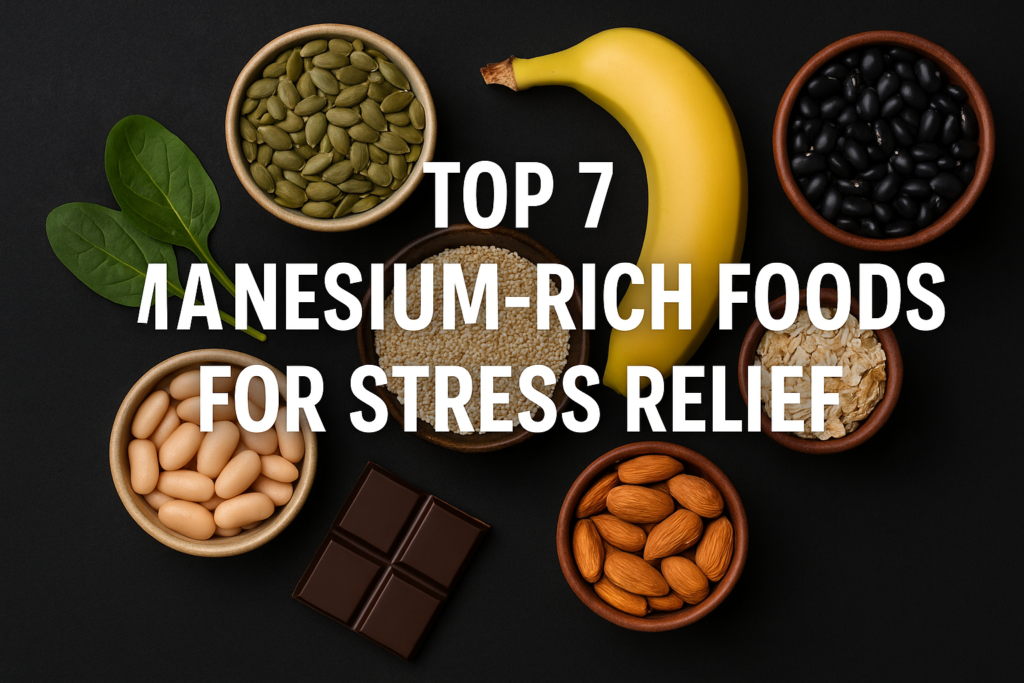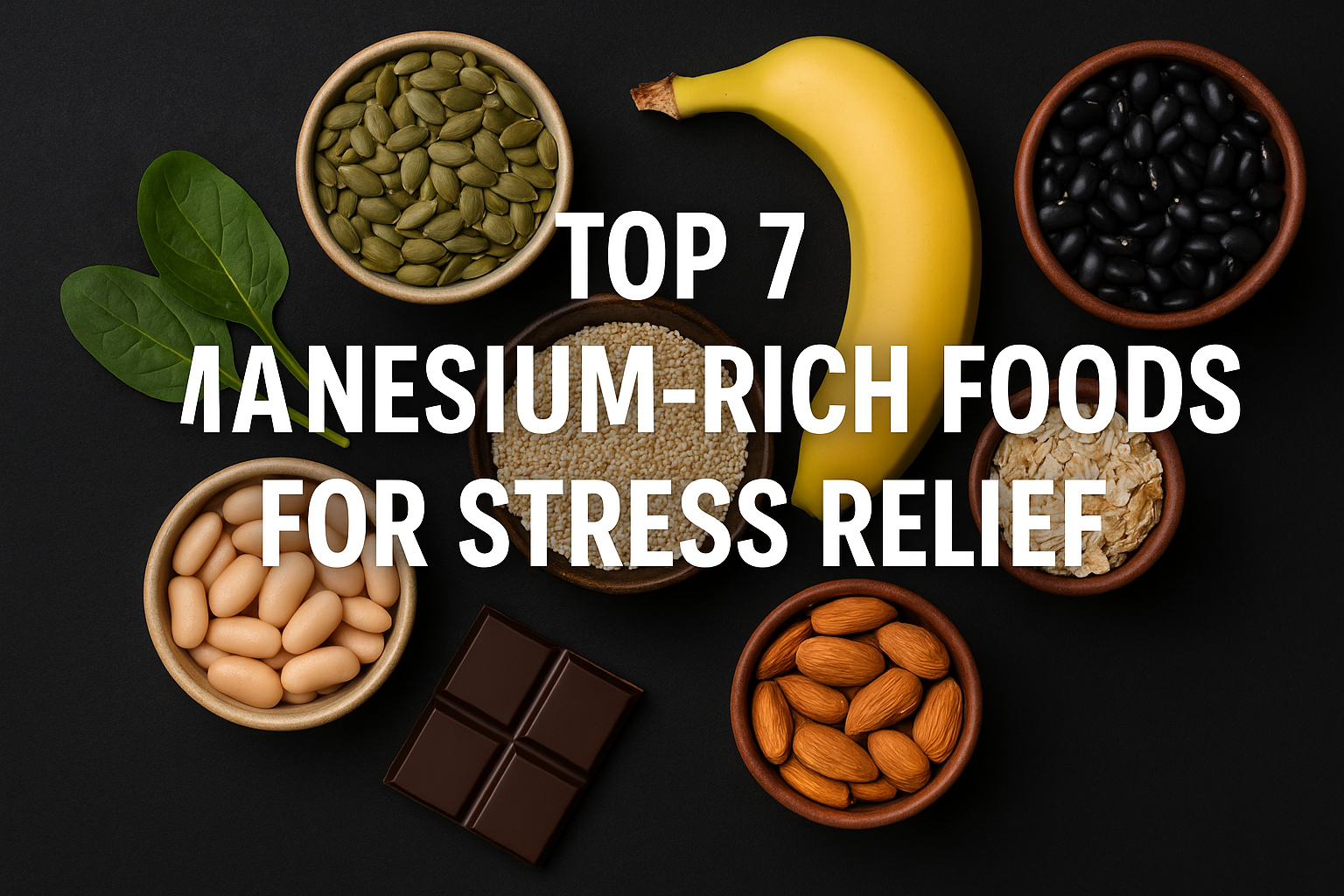Introduction: Why Magnesium is Key for Stress Relief
Magnesium is a vital mineral that plays a crucial role in over 300 biochemical processes in the body, including nerve function and mood regulation. Low levels of magnesium have been linked to increased anxiety, irritability, and sleep disturbances. If you’re looking to manage stress naturally, incorporating magnesium-rich foods into your diet is a powerful step. Let’s explore the top 7 magnesium-rich foods scientifically proven to promote relaxation and reduce stress.

-
Spinach
Magnesium per 1 cup (cooked): 157 mg (39% DV)
Spinach is a leafy green powerhouse loaded with magnesium, iron, and antioxidants. It’s perfect in salads, smoothies, or sautéed as a side dish. The high magnesium content helps regulate cortisol levels and promotes a sense of calm.
Quick Tip: Add a handful of spinach to your morning smoothie or omelet for a stress-relieving start to your day.
-
Almonds
Magnesium per 1 oz (about 23 almonds): 76 mg (19% DV)
Almonds are not only a great source of healthy fats and protein but also a convenient magnesium-rich snack. They support nervous system health and stabilize blood sugar levels, which can prevent mood swings and anxiety.
Snack Smart: Keep a small container of almonds at your desk or in your bag for a quick stress-relief snack.
-
Avocados
Magnesium per 1 medium avocado: 58 mg (15% DV)
Avocados are creamy, delicious, and incredibly nutrient-dense. Besides magnesium, they contain potassium and B vitamins—all essential for calming the nervous system and supporting adrenal health.
Stress-Relief Recipe: Try avocado toast with a sprinkle of pumpkin seeds (another magnesium-rich food) for a double dose of calm.
-
Dark Chocolate (70% or higher)
Magnesium per 1 oz (28g): 64 mg (16% DV)
Yes, chocolate can be good for you—when you choose the right kind. Dark chocolate is packed with magnesium and antioxidants like flavonoids, which can help reduce inflammation and improve mood.
Mindful Indulgence: Enjoy a small piece after meals or add cocoa nibs to yogurt or oatmeal.
-
Pumpkin Seeds
Magnesium per 1 oz: 168 mg (42% DV)
Pumpkin seeds are one of the most magnesium-dense foods available. They also contain zinc and iron, which are essential for immune and mental health.
Easy Add-On: Sprinkle pumpkin seeds on salads, smoothie bowls, or yogurt for an extra crunch and a stress-busting mineral boost.
-
Black Beans
Magnesium per 1 cup (cooked): 120 mg (30% DV)
Black beans are an excellent source of magnesium and fiber. They support healthy digestion and stabilize blood sugar, which can reduce stress-induced energy crashes.
Simple Meal Idea: Mix black beans into burrito bowls, soups, or veggie stir-fries for a filling and stress-reducing meal.
-
Bananas
Magnesium per 1 medium banana: 32 mg (8% DV)
While not the highest in magnesium, bananas are still a valuable source, especially combined with their high potassium and vitamin B6 content—both known to support brain health and mood.
Mood-Boosting Snack: Try a banana with almond butter for a tasty, calming treat.
How to Naturally Boost Magnesium Intake for Stress Relief
- Choose whole, unprocessed foods over packaged items.
- Incorporate a variety of magnesium-rich foods daily.
- Stay hydrated to help magnesium absorption.
- Consider a supplement if dietary intake is low (consult a healthcare provider).
Conclusion
Magnesium is your body’s natural chill pill. By including these 7 magnesium-rich foods in your daily diet, you can naturally reduce stress, support your nervous system, and improve overall wellness.
Start with small changes—like adding spinach to your lunch or snacking on almonds—and feel the difference in your mood and energy levels.
FAQs
Q: Can magnesium help with anxiety?
A: Yes, studies show that magnesium plays a role in brain function and mood regulation, making it effective in reducing anxiety symptoms.
Q: How much magnesium do I need per day?
A: Adults typically need 310–420 mg daily, depending on age and gender.
Q: Is it better to get magnesium from food or supplements?
A: Whole foods are the best source, but supplements can help if you have a deficiency. Always consult your doctor.
Follow for more:

Most Popular Articles








